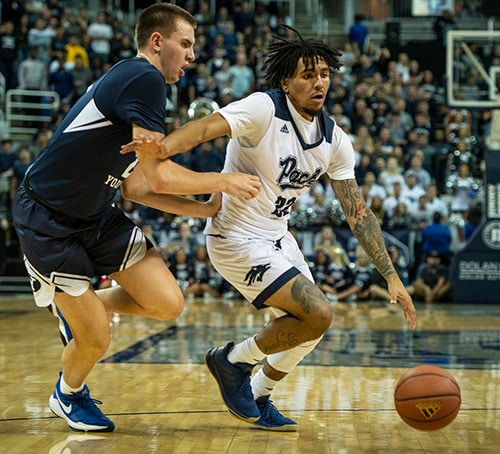
Tony Contini / Tahoe Onstage
Jazz Johnson’s greatest attribute is his ability to change the tune of his skeptics.
At 5-feet, 10-inches tall, the smallest player on the Nevada men’s basketball team has made giant contributions with his shooting accuracy and ability not to allow turnovers.
“My entire career I’ve been underestimated because I’m short,” said Johnson, who is a shooting guard on a squad that includes the talented backcourt of point guard Cody Martin and twin brother Caleb Martin, Nevada’s first-ever Associated Press preseason All-American.
Johnson, 22, is the sixth man for the sixth-ranked men’s basketball team in the nation. He isn’t a typical spark off the bench. He’s more like a warm fireplace on a wintry night. Everyone in Reno who wears Navy Blue and Silver feels comfortable and safe when the ball’s in his hands.
Johnson leads the nation in 3-point shooting percentage (31 of 52, at 59.6 percent). He’s made 23-stright free throws and is seventh in free-throw percentage (31 of 33, at 93.9 percent) and he has turned the ball over just three times all season. At 12.3 points per contest, Johnson is Nevada’s third leading scorer behind All-Mountain West Conference returners Caleb Martin and Caroline Johnson.
“Jazz is shooting almost 60 percent, so that’s a huge help for us,” Caleb Martin said. “That’s going to open up dribble lanes for us because he’s going to be able to extend the defense. People need to know where he is or he will just knock down the shot.”
Count Eric Musselman initially was among Johnson’s many skeptics. But he’s a believer now. What most impresses the head coach?
“At his size, (he has) the toughness and his ability to change the game with a snap of a finger,” Musselman said. “There are not a lot of guys who can come in and have a ‘Wow!’ impact, and he does. He’s a crowd favorite because of how hard he plays. He’s willing to take charges and he makes big 3-point plays. You look at his turnovers and the guy virtually never turns the ball over.”
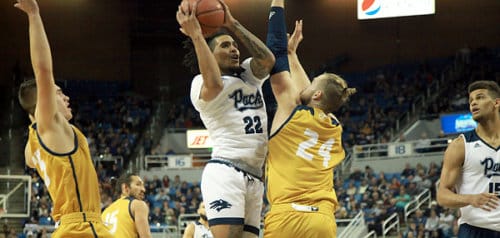
Jaaziel “Jazz” Johnson wasn’t always considered small. He was tall for his age until he stopped growing about the time he was in eighth grade. He played nose guard on a youth football team.
“Don’t get me wrong, I was a menace on that line,” he said.
What people usually did get wrong was the pronunciation of Johnson’s first name, Jaaziel (pronounced “Jah-Aye-Zeel”).
“Jaaziel means, ‘God will comfort; God will determine; God will strengthen,’ ” Johnson said. “People don’t know how to say my real name. It got to the point to where I was tired of explaining it every single time.”
Jazz was a natural nickname.
In the Bible, Jaaziel played the harp. Up in Lake Oswego, near Portland, Oregon, young Jazz played only basketball upon entering high school.
Johnson developed his great shooting touch through long hours practicing in the gym, often with his father, Leland Johnson, the musician in the family and a Golden State Warriors fan. In a metropolitan area known as Rip City — for its beloved and only professional sports team, the Portland Trail Blazers — Jazz Johnson grew up a Warriors fan.
“My dad was from Oakland, California, and he raised me to be an Oakland A’s fan, a Raiders fan and a Warriors fan,” he said. “There are a lot of bandwagon fans, but I liked the Warriors back when they had Baron Davis, Al Harrington and guys like that, and even before that when people didn’t look at the Warriors to do anything.”
(Ironically, it was a shot by the Blazers’ Jim Barnett (now a Warriors’ broadcaster) that led play-by-play announcer Bill Schonely to proclaim “RIP CITY!”)
Johnson does, however, appreciate the Blazers’ perennial Al-Star, Damian Lillard, also from Oakland.
“I don’t try to emulate him, but I respect his game, especially being a point guard,” he said. “He’s aggressive and looks to score. I can definitely say he’s someone who I study a lot.”
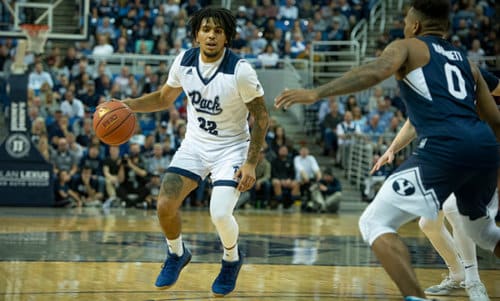
A point guard in high school, Johnson led the Three Rivers League in scoring during his junior and senior seasons. He scored 35 points in the Washington-Oregon Northwest Shootout all-star game and broke the scoring record at the Les Schwab Invitational.
Despite a phenomenal high school career, Johnson received only one college scholarship offer.
“It’s always been a fight for me,” he said. “I had looks, but my only offer was Portland. It wasn’t just because I was short. I was also kind of overweight. I never was an out-of-shape kid. I was in better shape than a lot of other kids. But I didn’t pass the eye test.”
The Portland University Pilots were coached by Eric Reveno, best known for developing skills for big men such as Chris Webber, Walter Berry and, as an assistant at Stanford, Jason Collins, and most recently at Georgia Tech, Ben Lammers.
Johnson’s freshman season was the 10th and final year at Portland for Reveno, who was fired after five-straight losing seasons.
Former Blazers point guard great Terry Porter was Johnson’s coach his sophomore year.
“Terry Porter was more of distributing point guard, so I learned from him different reads off the pick and roll,” Johnson said. “We ran a lot of pick and rolls at Portland.”
Johnson dislocated his shoulder during his freshman year, but he played through the pain, appearing in all 33 games, averaging 6.8 points in about 16 minutes per contest. He started all 33 games as a sophomore, averaging 15.8 points. He shot 82.3 percent from the free throw line and 44.4 percent from the floor. He made 61 of 147 3-point shots.
Johnson gained attention from other schools when he scored 26 points against St. Mary’s and 25 against UCLA.
“I had the dream of being the hometown kid who could turn around the program, but it’s hard when you play against those West Coach Conference powerhouses (Gonzaga, St. Mary’s and BYU),” Johnson said. “I realized I wasn’t going to be able to make it to the NCAA Tournament.”
Musselman brought Nevada — from a so-called Mid-Major conference — into national prominence by acquiring and developing transfers who spend a year practicing with the team before they gain eligibility. Although he had 5-foot-5 Earl Boykins and 5-11 Speedy Claxton when he was the head coach for Golden State, Musselman typically had success with larger guards. He wasn’t sure he wanted to take a chance on Jazz Johnson.
“I was at an AAU event with my son Matthew in Orange County,” Musselman said. “We were going back and forth because we’ve had so much success with taller guards. We were at John Wayne Airport and I kept watching tape of St. Mary’s game and UCLA’s game against Portland.
“My son (became frustrated and finally) said, ‘Dad, I really like him, but I’m going to go eat now — and if you don’t take Jazz Johnson, you’re a moron.’ So I give my son Matty Muss great recruiting-off-tape credit. He said either take him or make a mistake and (don’t) take him.”
Johnson’s innate knowledge of the Warriors helped him decide to accept Musselman’s offer.
“I was just excited he wanted to give me a chance because I knew he worked with Earl Boykins before — at 5-5, he was the second-shortest player ever in the NBA. …
“It was more like a career move. I only won 22 games in two years (at Portland) and here in Nevada they win more than 22 games every year. I wanted to further my career and show that I can contribute to a winning team because ultimately that puts a big part on your resume for the next level.”
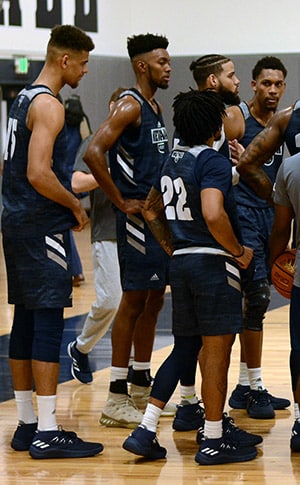
Tim Parsons / Tahoe Onstage
When Johnson arrived at the Reno campus, people were surprised he was a basketball player. But Caleb Martin knew he could help the team from the moment he stepped on the court.
“I was telling people about Jazz when he first got here, before he was even eligible to play,” Martin said. “People looked at me like I was crazy, ‘Jazz, he’s like 5-foot-not enough.’ I’ve been telling people about Jazz and it’s no surprise he’s shooting the way he is. I could tell he could shoot like that from when he first (arrived).”
Last year, Johnson was on a practice squad filled with transfers who helped prepare Nevada for its deep run into the NCAA Tournament. The Wolf Pack lost by a point to Loyola Chicago in the Sweet 16 round. “I attribute a lot to Nisre (Zouzoua), Corey (Henson) and Tre Thurman because they were the ones who were really out there every day. Before I got hurt, I was going hard, too.”
Johnson struggled during practices with the right shoulder injury that had occurred two years earlier. It was determined to be a torn labrum and, with trepidation, he agreed to have surgery.
“I didn’t know if I was going to be the same player just because a lot of my game does rely on the fact that I shoot the ball well,” he said.
During his rehab, Johnson dropped 35 pounds, going from 215 to 180.
“When people looked at me, they thought I was out of shape. I wanted to end that. So I changed my body. I dedicated myself to my body.”
How did he do it?
“Portion control. I ate less,” he said. If I feel full, I stop eating, rather than if I have a full plate of food to keep eating until the food’s gone. It was ‘eat some now and save the rest for later.’ And I did a lot more cardio.”
A preseason nationally ranked Top 10 team for the first time in school history, the two-time defending Mountain West regular season champions Wolf Pack faced huge expectations for 2018-19 when it stepped on court for the first time on Oct. 21 at Lawlor Events Center. In an exhibition game, Washington’s zone defense embarrassed Nevada, 91-73. The home team was atrocious. However, fans took notice of the new guard who came off the bench. Dreadlocks flying, Johnson darted on defense, dove for a loose ball, sank his first 3-point shot and his first two free throws.
When the regular season began, Nevada was back to playing at a high level. It is ranked fifth in the USA Today Coaches poll and sixth by AP. It starts five fifth-year-seniors, with Johnson, who is a junior, and freshman center Jordan Brown as the two top reserves. Johnson has played an average of 26.9 minutes this season. Typical of a Musselman team, the bench is short. Henson, a senior, and Zouzoua, a junior, who both have been impressive in practice, get some court time but are not in the usual rotation.
Musselman said when Johnson is in the game, the smaller lineup is much quicker at switching on defense. And when the offense appears to get an unfair advantage with a Johnson guarding a taller player, it usually doesn’t capitalize upon it.[pullquote]“We have great confidence in Jazz playing down the stretch for us.” — Coach Eric Musselman[/pullquote]
“Jazz has the bulk and the strength to hold his own from a leverage standpoint getting into the big guy’s legs,” Musselman said. “And then it’s up to the weakside help if they lob the ball up and try to get in there. In my four years here, our defensive weakside help’s been incredible.”
A point guard his whole life, Johnson has played at off-guard in 12 of Nevada’s 13 games. He missed the contest against South Dakota State due to concussion protocol. He wasn’t even allowed to practice free throws for a while after he ran into what he calls a “crackback screen” against Grand Canyon.
Since returning, he’s played 29 minutes in each of his two games. He’s made six of seven 3-point shots and all four of his free throws. He’s had four rebounds and five assists. And he’s had no turnovers.
“We have great confidence in Jazz playing down the stretch for us,” Musselman said. “With those guys who are a little bit smaller, you give them great freedom and make them feel that you really believe in them.”
“Muss has a lot of confidence in me and I have a lot of confidence in him,” Johnson said. “I just feel like he’s going to lead me down the right path and put me in successful situations.”
That path might lead back toward the NCAA Tournament. The Wolf Pack went unbeaten in nonconference, including three games against Pac-12 schools. It held one of the nation’s top scorers, South Dakota State’s Mike Daum, to a career-low five points and knocked off Arizona State, which later beat top-ranked Kansas.
Mountain West Conference play starts on Wednesday when Nevada hosts Utah State.
Johnson has set a goal.
“I know it’s cliché but it’s to be the best that we can be, whether that’s making it to the Final Four or whatever,” he said. “It’s just really about us working as hard as we can and, honestly, if we can be at our best, we can make it to the Final Four.”
— Tim Parsons
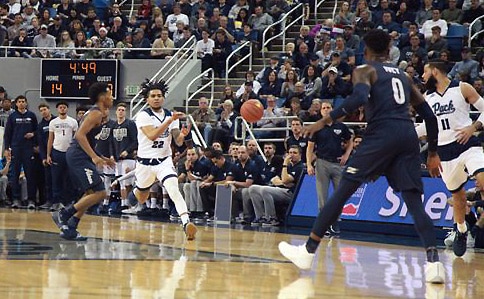
Conrad Buedel / Tahoe Onstage
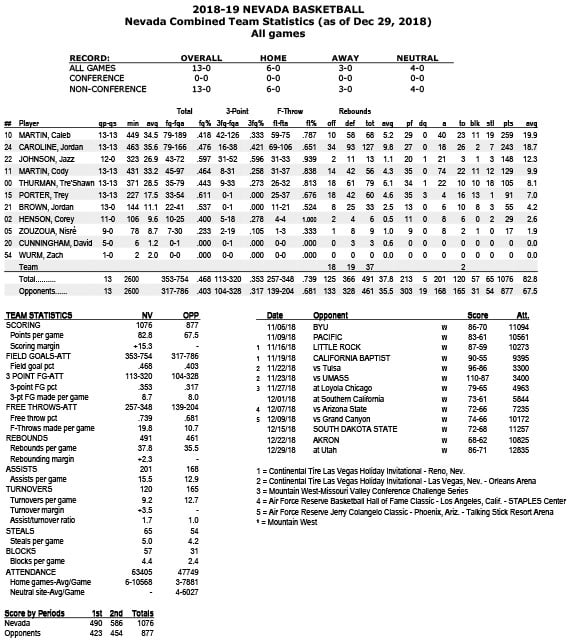
Winners of the last two MW Titles No. 5/6 Nevada hosts Utah State to begin conference play
- Nevada (13-0) has won the last two MW titles and begins defense of those titles when Utah State (10-3) comes to Lawlor Events Center on Wednesday. Tipoff is 8 p.m. No MW school has won three consecutive titles.
- The 13-0 start is the best in the Division I era that started in 1969-70 and another win would tie the 1951-52 team that started the year 14-0.
- The Pack moved up a spot to fifth in the USA Today Coaches polls and remained sixth in the AP poll. Fifth is the highest USA Today Coaches poll ranking in school history.
- Nevada has won its last two MW openers and is 2-1 under Musselman in conference openers.
- Caleb Martin scored a career-high 33 points, 25 in the second half in the win at Utah and also had a career best seven assists in addition he had four steals and two blocks in the victory over the Utes. He was named the MW Player of the Week for the second time this season. He scores 66 percent of his points in the second half, 171-of-259.
- Jordan Caroline is averaging near a double-double scoring 18.7 points and grabbing 9.8 rebounds per game. Caroline has eight double-doubles in 13 games this season and 35 in his Nevada career that is fourth in school history. The Pack is 33-2 when he posts a double-double. His 1,423 points in the Silver & Blue is 12th in Wolf Pack history and he is 19 points from passing Armon Johnson (2007-10) for 11th.
- Nevada has won five of the seven MW Player of the Week honors this season, Jordan Caroline (3) and Caleb Martin (2).
- Caleb Martin leads the MW averaging 5.7 assists per game as does his 3.4 assist/turnover ratio.
ESPNU
- Roxy Bernstein (Play-By-Play)
- Corey Williams (Analyst)
ON RADIO
Wolf Pack Radio Network – 94.5 FM, 630 AM
Pregame starts 30 minutes prior to tip-off
- John Ramey (Play-By-Play)
- Len Stevens (Color Analyst – home games)
ONLINE AUDIO/LIVESTATS
- NevadaWolfPack.com/Audio
- Sirius: 84 • XM 84 • Internet: 84 • TuneIn
- Live statistics – www.NevadaWolfPack.com/mbballls
